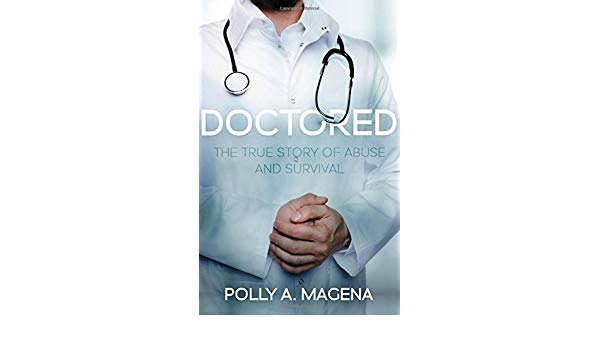- An Interview with Polly A Magena on her book: DOCTORED February 13, 2019 - PDAN Admins have had the privilege of reviewing this incredible book: Doctored – A shocking true account of abuse and medical misconduct by survivor, Polly A. Magena. Upon reviewing this book, PDAN admins have had the pleasure to personally interview Polly Magena on October 29th 2018. This […]
PDAN Admins have had the privilege of reviewing this incredible book: Doctored – A shocking true account of abuse and medical misconduct by survivor, Polly A. Magena.

In Polly’s memoir she states: “I wrote Doctored to help other survivors and because trauma is often a neglected subject, vulnerable to misdiagnosis” Upon reviewing this book, PDAN admins have had the pleasure to
personally interview Polly Magena on October 29th 2018. This interview gives insight into the thrilling accounts of her life’s story of trauma and survival. Her expressions give hope to others and shows resilience in
the face of adversity.Her book begins with childhood adversity as Polly faced emotional neglect, verbal attacks and rejection from her adoptive mother. Polly then suffered domestic abuse, leading to a serial rape by her once trusted doctor. Vulnerable and traumatized, Polly was ruthlessly exploited. Already burnt out by a first custody case which she won, the secret medical crimes kick-started another case when the abusive medic promised to help her get her children back from their father. He did nothing. In her book Polly further discusses various experiences, such as life as an adopted child with an unloving parent, being banished to a boarding school, being rejected by family and betrayed by friends, and the loss of her beloved children. Polly reveals the grueling details of how she fought for Justice after the court acquitted the doctor of his sex crimes.
Polly stated: “I became a one-woman campaign trying to expose the truth of what happened, the toxic medical misconduct and catastrophic malpractice”.
The PDAN Admin team asked Author Polly A. Magena 17 questions with reference to her book Doctored. Below you will find her raw and honest answers.
PDAN: Could you explain further how being adopted has had an affect on your mental well-being and how you cope with it?
Polly A. Magena: As an adoptee, I felt the family was fake and I felt alone, unwanted and rejected. My mother’s extreme abuse reinforced these feelings. To cope, I did well at school and lost myself in drama and music. I spent a lot of time playing piano, composing own music. Also I spent time in the countryside on my bike. Had a fantasy family in my thoughts who valued and loved me. Aware this was just imagination and removed me for a while from home maltreatment.

Book quote – Pg. 23. Here was the scene that would haunt me for years afterwards:
The nun coldly instructed us to say our goodbyes. Then my mother turned swiftly to my father, urging “Let’s go.” A huge surge of panic enveloped me so that as mom walked away, I grabbed hold of her skirt hem crying, “Mommy, Mommy”.
My heart breaking at being abandoned to that scary
institution.PDAN: You described how your adoptive mother expressed that as a child she was rejected. Do you believe this had an effect on how she parented you?
Polly A. Magena: Yes, my mother’s own maternal rejection probably affected her parenting. She told me she wasn’t maternal which shook me severely as this contradicted her past comments about me being loved and wanted–the false mask had crumbled and the truth froze me with shock. I was even told I was not liked!
PDAN: You speak of early sexual abuse on a train from a stranger. How do you think parents and companies could better protect our children?
Polly A. Magena: Back then, no one discussed child abusers therefore nothing was in place for protection. Parents in public places are responsible for their children’s care and should not be left unattended as we were then. We were allowed to run free around the train which was wrong. Maybe all travel tickets should carry a warning about child protection.
PDAN: You speak about being lied to surrounding your father’s health. What do you think about lying to children? even white lies?
Polly A. Magena: Generally, lying is wrong. White lies depend on context. In my case it was very damaging because not telling me that my father was dying at 18 stole precious time away from us both. Had I known the truth, I would have stayed home to be with him. Adventure could have waited. My mom and sister did not suffer this deprivation.
PDAN: You suffered from domestic abuse. What words can you give to our followers to help them seek help and refuge?
Polly A. Magena: I would have to say, to seek out support early. Without this support, the victim’s coping abilities are weakened. With having children, the problem is the fear of losing the them if the abuse is revealed. Having that said, when my sons were babies, harsh outcomes were the norm i.e., The removal of the children instead of the removal of the abuser.
PDAN: You explained the institutional abuse you experienced, both with your GP and a charity helpline. How did you find the strength to carry on?
Polly A. Magena: I felt destroyed inside but the angelic messages strengthened me and provided hope that my sons would return in the future. This came true! I kept my strong faith and showed consistent love to my sons, knowing that this love would help us rise above all the terrible adversity. I have a rich spiritual life. I prayed often about my children and knew that these were heard no matter what. Books on the subject helped me too.
PDAN: What advise can you give to others on speaking out about hidden abuse?
Polly A. Magena: This is a hard one for me. My advice would be to share with a trusted person about the abuse, as this reduces the stress and isolation.
PDAN: You mention in one chapter about God and religion. Can you speak more about your experience of religion in helping with mental illness?

Polly A. Magena: I believe in God like many others globally. To me, religion does not matter. Humans have always known in all cultures and times that there is a universal consciousness and if we are strongly connected, we have chance to heal. I never see trauma as mental illness: it is a normal response to abnormal events caused usually by other people or
disaster. Trauma books do state this cause and effect.
Our material world can fracture this vital link between us and God.
Being connected brings healing to mind and body.PDAN: How do you feel your adoptive mother’s death has affected you?
Polly A. Magena: I went into shock for 5 years and felt grief despite the abuse. Later on, I felt free to be myself without all the narcissistic control – It was an end to that.
PDAN: Could you give a little more details of your experience meeting your biological mother and if it helped or harmed your mental wellness?
Polly A. Magena: I have mixed feelings regarding this. It was good to meet her and fill the many gaps in my life, but later on I felt angry about another huge betrayal with her secret phone calls with my abusive ex behind my back. It became Crazy-making for me. It felt as if a potential ally turned into a traitor just like my adoptive mom.
PDAN: On page 308 you describe an experience of having “temporary regression” through visualizing yourself as a child being tucked in. Regression sometimes may be an unhealthy defense mechanism; do you think this was the case or a was it a helpful coping strategy at the time?
Polly A. Magena: Yes, I think this was probably a coping strategy at the time.
PDAN: How do you think we can educate doctors on psychological well-being more appropriately?

Polly A. Magena: This is such a huge problem, as doctors are not mental health professionals and, as in my case, they did a lot of damage psychologically and physically. In my own opinion, mind and body are closely linked. I believe all medical students should ideally study psychology for half of their time in medical school, with emphasis on abuse issues and emotional trauma as it is common and can frequently fly under their radar. It is simply not enough for med students so spend most of their time studying the body. This learning could be applied to other health professions as well. As I have written in the book, I gave my GP a trauma report written by an expert with the correct diagnosis of complex PTSD – my doctors ignored. This tells me that they have an attitude problem, as they have had several years to look at it and probably don’t want to face the stunning errors made about me and my life. Polly’s Experience Draws on the Need for Further Changes in the Mental Health Care field:
Polly express further on this topic:
Medical students need to be taught to respect their future patients. There are still a wealth of arrogance infecting the medical population. I really do think this education has to be ingrained where the roots of learning are (by the time doctors reach middle age, it is hard to change either their personality or indoctrination from the past). Importantly, some medics will be narcissistic and are motivated by a sense of power and control, rather than the desire to heal. There is a powerful author and survivor on this subject, Shahida Arabi who has penned several books about surviving the pain of narcissistic abuse. They are informative and life-affirming and a wealth of knowledge which many clinicians lack.PDAN: How has writing helped your mental health?
Polly A. Magena: Yes, writing helped my traumatic symptoms. It was a big relief to speak about what is true and the barrage of lies over decades. Writing expresses all my bottled up feelings and outs the long silence. Writing gives my power back because it was stolen!
PDAN: On page 164 you described something you call inter-dimensional living: being in the world yet existing outside of it simultaneously. Do you think were experiencing a form of disassociation? Polly A. Magena: Yes, this is dissociation due to high stress levels and major losses.
PDAN: In the latter part of the book you had mentioned your ex exhibiting behaviors of narcissism. Do you believe your mother exhibited traits of narcissism also?
Polly A. Magena: A Big YES! She was fully narcissistic, ticked all boxes for sure. I did not know this until recently.
PDAN: At the end of page 191 you said “nothing is higher than divine justice”. Could you elaborate on this and explain how it possibly gave you hope?

Polly A. Magena: I see the bigger picture of our lives which extends beyond our short physical ones here. It seems there are positive or negative outcomes in the afterlife according to our earthly actions. I was shown this when the violet light appeared across verses in the bible. All cultures understand this reality. PDAN: You mentioned a doctor’s speculation of a diagnosis of borderline personality disorder and expressed you felt it was another sexist jab. Could you explain why you felt it was sexist?
Polly A. Magena: For myself, and many others today, BPD was a misdiagnoses, when in actuality I had PTSD. I saw this in my own work and noted that only female patients were assigned this mistaken label. Men did not receive diagnosis of hysteria or BPD. Most abuse victims are women and can become burdened and damaged with these mistaken tags. We live in a patriarchal society where males hold powerful positions over females who are usually less powerful, poorer and less respected. Female experiences like rape or domestic abuse are horribly misunderstood and misinterpreted. Blaming a personality disorder is a quicker, convenient answer and shifts the blame away from male violators. In the past, mothers were blamed for autism. King Henry 8th executed some wives for not producing sons when it was his fault in reality!
A note from PDAN,
In conclusion we would like to urge all viewers to acknowledge the bravery it took Polly A. Magena to lay bare the years of traumatic events that took place. On behalf of the PDAN Admin team and our viewers, we thank you for sharing some of your most difficult experiences and vulnerable parts with us, in order that we may learn and benefit from your story.
We hope you find validation, empowerment and inspiration from this story. We kindly ask all our viewers to be respectful and supportive of one another as we engage in conversation proceeding this article.
Warm regards,
Oriana Allen & Jessica Ramplin, PDAN Admin Volunteers



Recent Comments